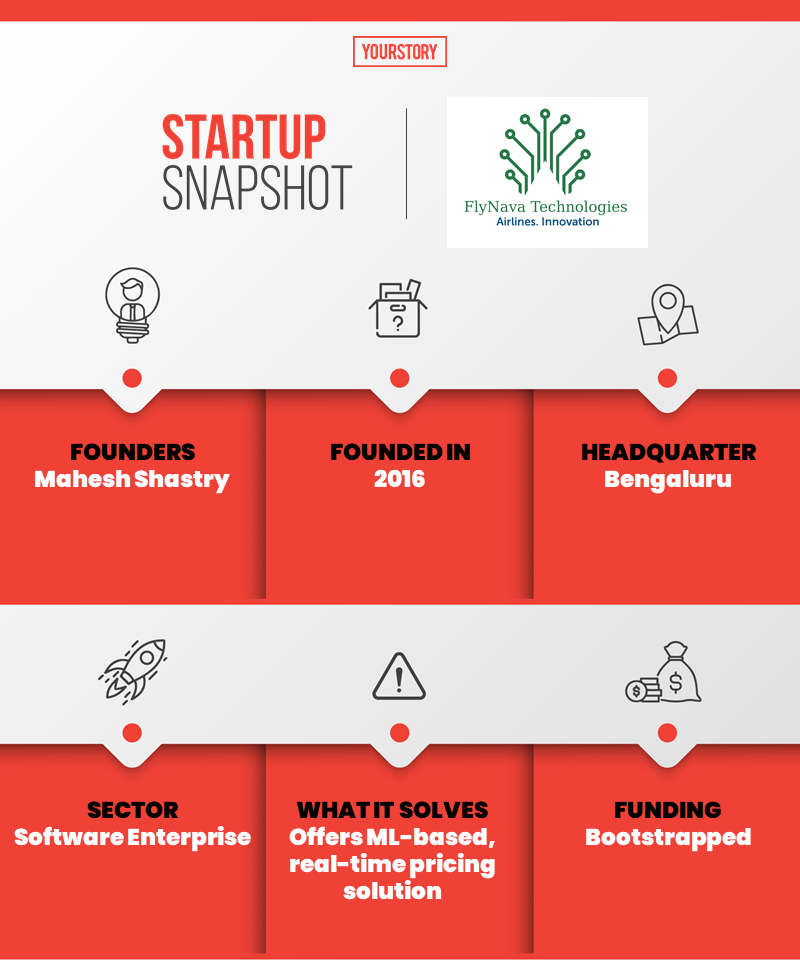The startup boom and technology intervention has changed the way we handle the simplest of everyday chores now. Behind the scenes, at least one of the many new-age technologies, including artificial intelligence (AI), machine learning (ML), Big Data, and Blockchain, among others, are at play.
Mahesh Shastry — who worked at Emirates Airlines for over a decade and a half — notes that the global airline industry has largely remained unchanged, especially with its pricing solutions.
In 1991, Mahesh joined the Emirates as a manager in the IT sales and accounts department in Dubai that focused on building internal products for the company. Nine years later, in 2000, he was the first employee of the company’s spin-off division, whose product was sold to other airlines company for $100 million.
This, and his wish to return to India, nudged him towards entrepreneurship. Mahesh says, “If I could create such a value as the first employee, I figured why not do it for myself?”
With the IT sector booming at the time, Mahesh wanted to understand how the industry worked. He shares most stakeholders engaged only in services with little happening in the field of product development.
In his role as the Senior Vice President at NIIT Technologies, Mahesh continued to work closely with the airline industry. In 2016, he founded FlyNava Technologies that leverages ML and automation to design a pricing solution to maximise profits for the airline industry.
Based in Bengaluru, the B2B pricing solution startup has made it to the special mentions category of YourStory’s curated list of Tech30 startups this year.

From dynamic to continuous pricing
Dynamic pricing refers to a model of pre-determined static price points, where airfare changes as a response to factors like time and seasonal demand. It does not take a buyer’s persona into account while suggesting the prices.
For 40 years now, the airline industry continues to follow this model since it came into practice around 1978. Indian airlines used to offer a fixed price regardless of the time of booking tickets before adopting the dynamic model.
According to Mahesh, the global airline industry is a complete mess, where demand generation poses the biggest challenge. This, he believes, is because the economy has moved onto a “Uber world,” which operates on a continuous pricing model. This means airline prices are calculated and presented in real-time.
Its flagship product — Jupiter — is a data analytics platform that records information — including destination, day of travel, and categories, such as economy or business class — and offers the ideal price for the passenger.
“Airline is a business with an anonymous shopper. We don't know who is coming, but each has a different requirement and propensity to pay, different backgrounds, and reasons to travel. And, machine learning helps determine suitability for the customers,” Mahesh explains.
For instance, someone booking tickets from Bengaluru to Boston two months ahead of their travel is likely to be a university student, while a person who buys a ticket at the last minute could be a businessman.
“The price won’t be reduced significantly as he is well off to study abroad, but it will be personalised by providing extra baggage capacity,” he adds.
If a businessman tries to get the same ticket, the system fine-tunes the condition and makes it available only for students or similar profiles who are purchasing in advance, so that the airline company does not lose out on customers, who normally pay around Rs 1,50,000 for a one-way ticket.
Mahesh says that such patterns are automated, and ML is trained to personalise to ensure each customer profile receives a price that is relevant and convenient for them.
The entrepreneur says, “We are building on the existing decades-old mechanism to make sure that the whole process is automated and given instantly. We are disrupting the airline pricing system by working with the past and not removing it.”

Team FlyNava Technologies
Market entry
The startup secured its first big contract with Fly Dubai in 2017 and US-based Delta Airlines in 2018.
Before signing a contract for three years, the software enterprise business runs paid proof of concept to prove and validate with the airline pricing analyst.
FlyNava Technologies earns a monthly fee for its ML-based product Jupiter. Once installed, the software is customised for the airline’s domestic and international market.
Bootstrapped so far, the startup is profitable and targets $1 million from small to medium airline companies, and between $3 million and $5 million from larger clients per year.
In the last three years, it clocked an annual revenue between Rs 3 crore and Rs 6 crore. In fact, it hopes to raise funding worth $3 million to $6 million in the next year.
Mahesh says that Jupiter was built to deploy across industries in the global market. Most recently, it has integrated the data analytics platform in the insurance industry to help determine real-time, customised premiums for individual customers.
Edited by Suman Singh
Link : https://yourstory.com/2020/10/tech-30-b2b-startup-real-time-pricing-ml-airline-industry
Author :- Tenzin Norzom ( )
November 04, 2020 at 05:25AM
YourStory


